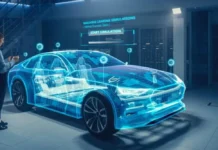For many, the allure of the open road beckons. Interstate travel offers the freedom to explore new destinations, create lasting memories with loved ones, and experience the diverse landscapes of America. However, long journeys can also be fraught with challenges – driver fatigue, unpredictable road conditions, and the ever-present possibility of getting lost or encountering unexpected delays. Fortunately, the landscape of car safety technology is rapidly evolving, transforming interstate travel into a safer and more enjoyable experience. These advancements are not just about bells and whistles; they are revolutionizing the way we navigate long distances, putting safety and convenience at the forefront of every road trip.
Advanced Driver-Assistance Systems (ADAS)
Gone are the days of relying solely on instinct and roadside signs. Modern cars are equipped with a suite of ADAS features that act as a virtual co-pilot, enhancing safety and reducing driver fatigue.
Lane Departure Warning (LDW) and Lane Keeping Assist (LKA)
These systems utilize cameras or sensors to monitor lane markings. If the car begins to veer out of its lane unintentionally, the LDW system will sound alert or vibrate the steering wheel, while LKA can gently nudge the car back into its lane. This car safety technology is particularly helpful on long stretches of highway, where fatigue can lead to lane drifting.
Blind Spot Monitoring (BSM)
BSM utilizes radar or camera sensors to detect vehicles in your blind spot, a common cause of accidents when changing lanes. When a car enters your blind spot, the BSM system will typically activate a warning light on the side mirror or dashboard, alerting you to potential hazards.
Adaptive Cruise Control (ACC)
This innovative feature takes the tedium out of highway driving. ACC allows you to set a desired speed and following distance. The car will automatically maintain that speed and adjust to the flow of traffic, reducing the need for constant pedal adjustments and minimizing driver fatigue.
Real-Time Information at Your Fingertips
Getting lost on a road trip can be frustrating. Thankfully, modern navigation systems have come a long way, providing real-time information that keeps you on track and informed.
Real-Time Traffic Updates
Gone are the days of relying solely on traffic reports broadcast every hour. Advanced navigation systems utilize real-time traffic data to identify congestion and suggest alternative routes, saving you valuable time and frustration.
Weather Alerts
Unpredictable weather can significantly impact road conditions. Advanced navigation systems can provide real-time weather updates, allowing you to plan your route around potential hazards like heavy rain, snow, or fog.
Traffic Law Apps
Several mobile applications provide comprehensive information on traffic laws across the United States. These apps can be a convenient resource for quickly checking speed limits, hands-free device laws, and other important regulations.
Point-of-Interest (POI) Search
Modern navigation systems using car safety technology allow you to search for a variety of points of interest (POIs) along your route, including gas stations, restaurants, rest stops, and attractions. This makes it easier than ever to find everything you need without having to consult a map or pull over and search your phone.
Connected Car Technology
Connected car safety technology adds another layer of security to your long-distance adventures. Imagine a flat tire on a deserted stretch of highway. With connected car technology, you can connect directly to roadside assistance through your car’s built-in system. Help will be dispatched to your exact location, eliminating the need for panicked phone calls or scrambling for a tow truck number.
Furthermore, some systems can even detect a collision and automatically connect you to emergency services, ensuring you receive critical assistance when it matters most. Connected car technology provides peace of mind by offering a safety net on the open road, allowing you to focus on enjoying the journey.
The Tech of Road Trips: A Connected and Safe Journey
The future of interstate travel promises even greater advancements that will redefine the road trip experience. Imagine a world where fully autonomous vehicles handle the driving duties, allowing you to relax, work, or simply enjoy the scenery. Vehicle-to-everything (V2X) communication could revolutionize road safety by enabling cars to “talk” to each other and infrastructure, providing real-time warnings about hazards and optimizing traffic flow. Additionally, the future holds the potential for even more inclusive safety features. Self-parking systems could be a game-changer for drivers with limitations, while automated emergency braking systems could prevent accidents entirely. As car safety technology continues to develop, we can expect a future where long-distance travel is not only more convenient but also safer for everyone on the road.
Navigating the Future of Road Trip Tech
The open road continues to beckon, but thanks to car safety technology, we can now embark on our journeys with greater confidence and peace of mind. From ADAS features that keep us safe on the road to connected car technology that provides assistance when needed, these advancements are transforming long-distance travel into a more enjoyable and stress-free experience. So, buckle up, embrace the technology, and get ready to experience the magic of the road trip in a whole new way. The future of interstate travel is here, and it’s designed to put safety and enjoyment at the forefront of every adventure.















